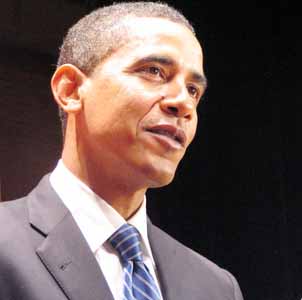Planet Obama: The first year
 Few US leaders have captured the enthusiasm of the world as Barack Obama did on election night 2008.
Few US leaders have captured the enthusiasm of the world as Barack Obama did on election night 2008.
From Paris to Beijing, Rio to Oslo, Johannesburg to Cairo, people gathered in bars, hovered in public squares and watched TV through the night awaiting the November 4 results.
When it was clear that US voters had decisively sent Obama to the White House, glee roared through the hometown masses in Chicago. Horns blared and tears flowed across the US. Cheers ricocheted worldwide. The townspeople of Obama, Japan, danced.
"Your victory has demonstrated that no person anywhere in the world should not dare to dream of wanting to change the world for a better place," wrote South Africa's Nelson Mandela to the president- elect.
The relief was great that George W Bush, one of America's most globally unpopular leaders, was leaving. So was the joy that the once-racially segregated nation had elected its first African American leader - "a fairy tale," said Poland's Foreign Minister Radek Sikorski.
Along with the fervor came a smothering flood of expectation that Obama would mediate all wars and conflicts, put a derailed world economy back on track and make everyone happy by being the non-Bush.
Mandela, who as South Africa's first post-apartheid president in 1994 had his own challenge of meeting soaring expectations, called for Obama "to combat the scourge of poverty and disease everywhere."
President Mahmoud Ahmadinejad, the first Iranian president since the 1979 Islamic revolution to congratulate a US president on victory, seized on Obama's pledge to hold unconditional talks on his country's controversial nuclear programme. Lebanon's Shiite House speaker Nabih Berri wanted Obama to "start by resolving the Middle East crisis."
Europeans envisioned cooperation after eight icy Bush years, with climate change and dialogue with Iran at the top of the list.
Cooler heads advised caution. "Despite his African-sounding name, Obama is American as apple pie or baseball," South Africa's Financial Mail noted.
Obama warned after his victory that he could not live up to messiah-like expectations, saying that "the road ahead will be long" and the climb "steep."
"Steep" wasn't the half of it.
After riding a brief wave of euphoria after his January inauguration, Obama started grappling with the huge challenges left behind by Bush: wars in Iraq and Afghanistan; the controversial prison at Guantanamo Bay for terrorist suspects; the worst economy since the Great Depression of the 1930s; festering nuclear concerns in Iran and North Korea; a collapsed climate change dialogue.
Along the way, Obama sometimes disappointed. Little progress has been made in the Middle East peace process. His desire to close the Guantanamo Bay prison by January 22 is in doubt. US troops are still in Iraq. At the moment he is deliberating whether to escalate the war in Afghanistan.
Nonetheless, with his Democratic rival for the presidential nomination, Hillary Rodham Clinton, as his secretary of state, Obama set a new course of foreign policy eschewing the ideological bent of the Bush administration.
On the Mideast, Obama sought to be a more neutral broker, taking a clear stance against Israeli settlement activity. With talks stalled again, some argue that Obama's administration underestimated the willingness of Israel Prime Minister Benjamin Netanyahu to agree to a total freeze.
In the Arabic Middle East, initial euphoria faded as Arabs awaited concrete policy changes. But Obama remains broadly popular there.
On China, Obama has faced down criticism by rights activists. One of Clinton's first trips was to Beijing, where she startled fans by insisting there were more important things - such as the economy - to discuss than human rights. In October, Obama refused to meet with the exiled Tibetan spiritual leader, the Dalai Lama, a Nobel Peace laureate, lest it taint his upcoming trip to China.
With Russia, Obama moved quickly into negotiations to reduce nuclear stockpiles - discussions eased by his dropping controversial plans to base a missile-defence system in Eastern Europe.
When North Korea played its recurring game of nuclear thrust and parry, Obama pushed for a unified world reaction to further isolate the Stalinist state, and got Russia and China to go along.
With Iran, the US conducted the first high level talks in decades.
In his ancestral Kenya, Obama pushed against corruption and for delayed justice in the 2007 post election violence, ordered one travel ban and threatened others, and snubbed Kenya on his first trip to Africa as president.
Still, ordinary Kenyans love him, plastering his name and photo everywhere.
South-East Asia has welcomed Obama's re-engagement with the region.
"It seems that this administration is very interested with how the region thinks," said Thani Thongpakdi, deputy spokesman for the Thai foreign ministry.
So, has Obama accomplished in his first year on of his top goals - restoring America's good name in the world?
The Nobel Peace Prize committee apparently thought so, stunning the world by awarding the fledgling leader the world's most prestigious peace mantle.
At home and abroad, the decision puzzled and even provoked, as Obama's popularity dipped amid a still flagging economy and huge government spending.
For Anna Ek, president of the respected Swedish Peace and Arbitration Society (SPAS), Obama should have been disqualified because he is "president of the world's largest military power and waging two wars."
Sixty-one percent of Americans believed Obama did not deserve it, a Pew survey showed, and the US president seemed to agree.
"Let me be clear, I do not view it as a recognition of my own accomplishments, but rather as an affirmation of American leadership on behalf of aspirations held by people in all nations," Obama said. (dpa)